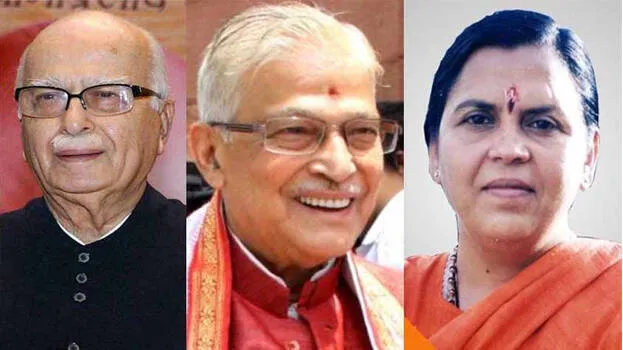

A special CBI court in Lucknow has fixed Wednesday, September 30 for pronouncement of its judgment in the Babri Masjid demolition case.
While the Supreme Court has delivered the final judgment in the Ayodhya title suit, Wednesday’s judgment will be the first in the nearly 28-year-old demolition case. Once pronounced, it can be challenged in higher courts.
Of the 49 accused, 32 are alive today.
The cases filed
After the demolition of the Babri Masjid on December 6, 1992, two separate cases were filed at Ram Janmabhoomi police station in Faizabad.
The first was filed at 5.15 pm by the then SHO, Priyamvada Nath Shukla, against unknown kar sevaks. This was under IPC sections 395 (dacoity), 397 (robbery or dacoity, with attempt to cause death or grievous hurt), 332 (voluntarily causing hurt to deter public servant from duty), 337 (causing hurt by act endangering life or personal safety of others), 338 (causing grievous hurt by act endangering life or personal safety of others), 295 (injuring or defiling place of worship with intent to insult the religion of any class), 297 (trespassing on burial places, etc) and 153-A (promoting enmity between different groups on grounds of religion, race, place of birth, residence, language, etc., and doing acts prejudicial to maintenance of harmony). Police also invoked Section 7 of the Criminal Law Amendment Act.
The second FIR was filed 10 minutes later by sub-inspector Ganga Prasad Tiwari, in-charge of Ramjanmabhoomi police outpost, against eight persons including senior BJP leaders — L K Advani, Murli Manohar Joshi, Ashok Singhal (now deceased), Giriraj Kishore (deceased), Vishnu Hari Dalmia (deceased), Vinay Katiyar, Uma Bharti and Sadhvi Ritambhara. This was under IPC sections 153-A, 153-B (imputations, assertions prejudicial to national integration) and 505 (statements conducing to public mischief).
Between December 6 and 21, police registered 47 more FIRs, mostly relating to assault on and looting of media persons during the demolition.
The CBI probe
The state government initially assigned the case against unidentified kar sevaks to the Crime Branch’s Criminal Investigation Department (CB-CID). On December 12, 1992, the state sent a recommendation to the Centre for transfer of the investigation to the CBI, which lodged an FIR and began its investigation the following day.
The other case, in which Advani and others were named, was investigated by local police and thereafter the CB-CID. On December 16, the state government in consultation with the Lucknow Bench of the Allahabad High Court issued a notification setting up a special court of a judicial magistrate in Lalitpur for this case. After getting sanction, the CB-CID filed a chargesheet against Advani and the seven others in this court on February 27, 1993.
On July 8, 1993, the state government in consultation with the High Court issued another notification, transferring the place of sitting of the court from Lalitpur to Rae Bareli.
In August 1993, the state government sent a recommendation for a CBI probe into the other 48 FIRs. The CBI was handed over all these cases.
In September, the state government, in consultation with the High Court, issued another notification constituting a special court in Lucknow for the cases relating to demolition.
Meanwhile, the CBI moved an application in the Rae Bareli court, seeking — and getting — CBI permission for further investigation in the case against Advani and others.
The CBI case in court
On October 5, 1993, the CBI filed a chargesheet against 40 persons in the Lucknow court. On October 8, the state government issued a notification that the case against Advani and others would also be heard in Lucknow.
In January, 1994, the Rae Bareli court transferred records on the demolition case to the Lucknow court. In 1996, the CBI filed a supplementary chargesheet against nine more persons.
In September 1997, the Lucknow court took cognisance of the CBI chargesheet and ordered charges be framed against accused. Summonses were issued. In its chargesheet, the CBI claimed it had evidence that the demolition was the fallout of a larger conspiracy. Charges under section 120-B IPC were added.
In February 2001, 33 of the accused filed a petition in the High Court challenging the summonses issued by the Lucknow court.
They also challenged the trial of the case against Advani and others in the Lucknow court. Their ground was that the state government had issued the notification on the transfer of the case without consulting the High Court. The CBI requested the government to issue a fresh notification after consultation with the High Court; the government did not.
On February 12, 2001, the High Court passed an order finding no illegality in a joint single chargesheet for all the FIRs on the ground that all the offences were committed in the course of the same transaction to accomplish the conspiracy, and that the evidence for all offences is almost the same. The court upheld the framing of charges in all 48 cases, except the one against Advani and others.
“The High Court observed that the notification dated October 8, 1993, by which the trial of the case in which Advani and others were accused was transferred to Lucknow, was legally not sound,” said defence counsel Abhishek Ranjan. The High Court said the mistake in issuing the notification on October 8, 1993 was curable and this could be done through another notification.